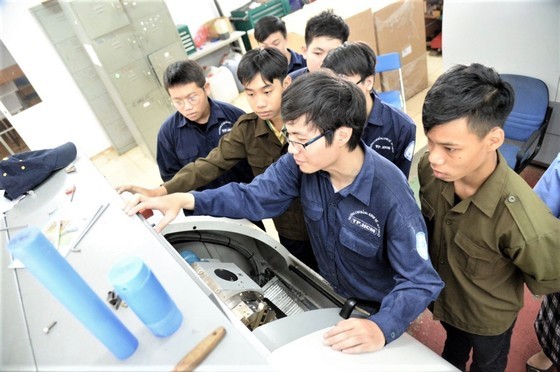 |
Students and teachers of a vocational school |
The first conference of the Council of Principals of Colleges and Vocational Schools in the city in 2023 yesterday took place at Ho Chi Minh City College of Economics chaired by Vice Chairman of the Ho Chi Minh City People's Committee Duong Anh Duc.
Limitations
Director of the HCMC Department of Labor, Invalids and Social Affairs Le Van Thinh assessed that in recent times, vocational education institutions (VEIs) on a city scale have achieved many positive results in orchestrating work orientation and student recruitment. Teachers and students of vocational schools have made remarkable achievements in national and international vocational skills competitions.
However, the enrollment results for short-term training occupations still account for a high proportion of the overall annual enrollment results. This makes it difficult for most workers to adapt to rapid changes in science and technology compared to workers with vocational or college degrees. The work of digitalization and digital transformation has not been fully implemented by VEIs. In addition, many VEI facilities are degraded, having outdated technical teaching facilities, and small campus areas, and not complying with regulations.
To help the city's VEI facilities develop, Mr. Le Van Thinh noted that all units strictly implement the Standing Committee of the Ho Chi Minh City Party Committee’s Plan No. 267-KH/TU dated September 21, 2023, to strengthen several measures.
In 2024, the Council of Principals needs to push promotional campaigns and work orientation in VEIs; Schools are responsible for providing information about post-graduate students at their faculties according to the instructions of the Department of Labor, Invalids and Social Affairs to create a field database for the institution, as well as vocationally trained labor.
Establishing coordination and engagement mechanisms between schools and businesses in each industry group will promptly provide human resources according to the recruitment needs of businesses and society, Mr. Le Van Thinh suggested.
Special policies should be soon implemented
According to Dr. Le Dinh Kha, Principal of Cao Thang Technical College, the city has set a target for the rate of trained workers to reach 87 percent by 2025 and 89 percent by 2030. However, there are not many VEIs training in mechanical and automation, and the trained human resources have not met the quantity required by society.
The city needs to have superior regimes and policies in building a team of teachers in the direction of standardization, ensuring quantity, synchronization in structure and quality of vocational skills to improve the quality of human resource training according to the requirements of the labor market.
Simultaneously, the city should encourage and enhance the responsibility and reputation of mechanical and automation professional associations in training high-quality human resources to serve its goals.
Similarly, Principal of Thu Duc College of Technology Vo Long Trieu said that in the city, there are currently about 5,500 businesses operating in electronics-information technology (IT) and nearly 2,000 startup businesses. Of which, the number of startups in the IT field is about more than 1,400 accounting for 70 percent. To meet the needs of businesses, vocational schools need to build good technical infrastructure in teaching and learning as well as improve training content and methods to satisfy society's needs.
The IT industry has short product life cycles and constantly changing technology, so universal training is inevitable. Retraining can be done through organizing on-the-job training or hiring reputable training units, Mr. Trieu suggested.
Addressing the conference, Vice Chairman of Ho Chi Minh City People's Committee Duong Anh Duc affirmed that the city is a major vocational education center of the country with nearly 200,000 graduates from vocational levels each year, accounting for 87 percent of the country's workers receiving annual vocational training.
However, each school’s strength has not been effectively promoted because there is still overlap in vocational training, and the key training strengths of each school have not been promoted. Therefore, each vocational education institution needs to self-review and evaluate its practice from which they will set strategies, plans, and roadmaps to overcome shortcomings and limitations as well as identify key areas to focus on training and avoid multi-disciplinary training without good orientation.
Worryingly, the number of workers who can meet the needs of businesses is not high. Thus, the Board of Principals of each school must assume responsibility for finding a solution to overcome this inadequacy. For immediate tasks, the Department of Labor, Invalids and Social Affairs of Ho Chi Minh City should coordinate closely with their sub-departments to have advice in planning and rearranging vocational schools according to the Secretariat’s Directive 21 and the Standing Committee of the Ho Chi Minh City Party Committee’s Plan 267, said Mr. Duong Anh Duc.
























